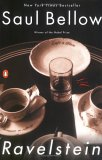Summary | Excerpt | Reading Guide | Reviews | Readalikes | Genres & Themes | Author Bio

Critics' Opinion:
Readers' Opinion:
First Published:
Apr 2000, 224 pages
Paperback:
May 2001, 224 pages
This morning he was again urging me to go more public, to get away from the private life, to take an interest in "public life, in politics," to use his own words. He wanted me to try my hand at biography, and I had agreed to do it. At his request, I had written a short account of J. M. Keynes's description of the arguments over German reparations and the lifting of the Allied blockade in 1919. Ravelstein was pleased with what I had done but not quite satisfied as yet. He thought I had a rhetorical problem. I said that too much emphasis on the literal facts narrowed the wider interest of the enterprise.
I may as well come out with it: I had a high school English teacher named Morford ("Crazy Morford" we called him) who had us reading Macaulay's essay on Boswell's Johnson. Whether this was Morford's own idea or an item in the curriculum set by the Board of Education, I can't say. Macaulay's essay, commissioned in the nineteenth century by the Encyclopedia Britannica, was published in an American textbook edition by the Riverside Press. Reading it put me into a purple fever. Macaulay exhilarated me with his version of the Life, with the "anfractuosity" of Johnson's mind. I have since read many sober criticisms of Macaulay's Victorian excesses. But I have never been cured - I never wanted to be cured of my weakness for Macaulay. Thanks to him I still see poor convulsive Johnson touching every lamppost on the street and eating spoiled meat and rancid puddings.
What line to take in writing a biography became the problem. There was Johnson's own example in the memoir of his friend Richard Savage. There was Plutarch, of course. When I mentioned Plutarch to a Greek scholar, he put him down as "a mere litterateur." But without Plutarch could Antony and Cleopatra have been written?
Next I considered Aubrey's Brief Lives.
But I shan't go through the whole list.
I had tried to describe Mr. Morford to Ravelstein: Crazy Morford was never downright drunk in class, but he obviously was a lush-he had a drunkard's red face. He wore the same fire-sale suit every day. He didn't want to know you, he didn't want to be known by you. His blue abstract alcoholic look was never directed at anyone. Under his disorderly brow he fixed his stare only at the walls, through the windows, into the book he was reading. Macaulay's Johnson and Shakespeare's Hamlet were the two works we studied with him that term. Johnson, despite his scrofula, his raggedness, his dropsy, had his friendships, wrote his books just as Morford met his classes, listened to us as we recited from memory the lines "How weary, stale, flat and unprofitable seem to me all the uses of this world." His grim cropped head, his fiery face, his hand clasped behind his back. Altogether flat and unprofitable.
Ravelstein wasn't much interested in my description of him. Why did I invite him to see the Morford I remembered? But Abe was right to put me onto the Keynes essay. Keynes, the powerful economist-statesman whom everybody knows for The Economic Consequences of the Peace, sent letters and memoranda to his Bloomsbury friends reporting on his postwar experiences, in particular the reparations debates between the defeated Germans and the Allied leaders-Clemenceau, Lloyd George, and the Americans. Ravelstein, a man not free with his praises, said that this time I had written a first-class account of Keynes's notes to his friends. Ravelstein rated Hayek higher than Keynes as an economist. Keynes, he said, had exaggerated the harshness of the Allies and played into the hands of the German generals and eventually of the Nazis. The Peace of Versailles was far less punitive than it ought to have been. The war aims of Hitler in 1939 were no different from those of the Kaiser in 1914. But setting this serious error aside, Keynes had a great many personal attractions. Educated at Eton and Cambridge, he was polished socially and culturally by the Bloomsbury group. The Great Politics of his day had developed and perfected him. I suppose in his personal life he considered himself a Uranian-a British euphemism for homosexual. Ravelstein mentioned that Keynes had married a Russian ballerina. He also explained to me that Uranus had fathered Aphrodite but that she had had no mother. She was conceived by the sea foam. He would say such things not because he thought I was ignorant of them but because he judged that I needed at a given moment to have my thoughts directed toward them. So he reminded me that when Uranus was killed by the Titan Cronus, his seed spilled into the sea. And this somehow had to do with reparations, or with the fact that the still blockaded Germans just then were starving.
Reprinted from Ravelstein by Saul Bellow by permission of Penguin Putnam Inc. Copyright 2000, Saul Bellow. All rights reserved. This excerpt, or any parts thereof, may not be reproduced in any form without permission





The Funeral Cryer by Wenyan Lu
Debut novelist Wenyan Lu brings us this witty yet profound story about one woman's midlife reawakening in contemporary rural China.
Your guide toexceptional books
BookBrowse seeks out and recommends the best in contemporary fiction and nonfiction—books that not only engage and entertain but also deepen our understanding of ourselves and the world around us.